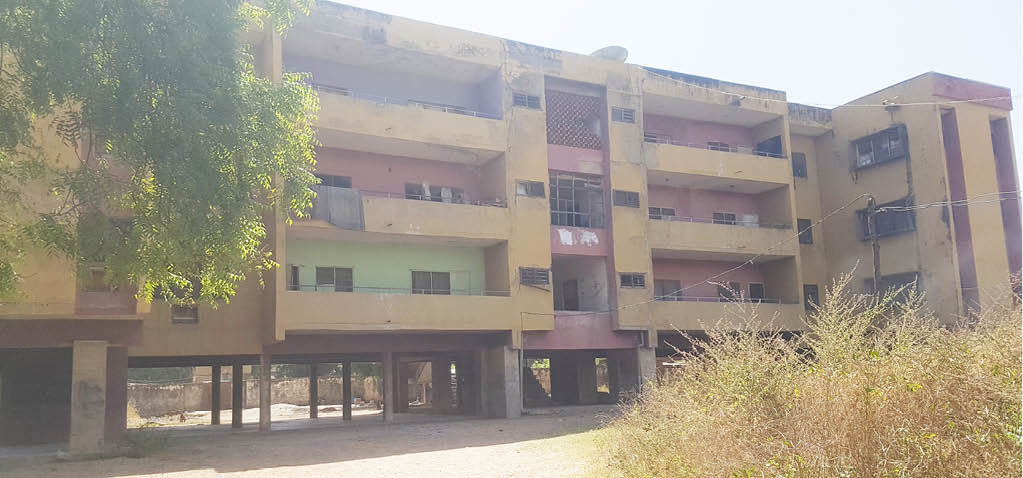Government Reserved Areas (GRAs) in Kano have lost their original purpose as different structures have taken over the places where colonial masters used to stay away from the crowd and entertain guests. The situation is also generating accusations and counter-accusations between former Governor Rabiu Musa Kwankwaso and his successor, Abdullahi Ganduje.
The Government Reserved Area (GRA) in Nasarawa, Kano, is one of the locations the colonial masters mapped out for use to avoid crowd in the city and other noisy areas. They also did that in order to have a conducive atmosphere to work.
- CNG says Buhari failed on security, seeks ‘regulated self protection’
- Madrid defeat Sevilla to ease pressure on Zidane
When Nigeria got its independence in 1960, various governments retained the reserved areas for the use of their officials and to lodge special guests.
Observers said this had saved the government a lot of money and the burden of lodging their guests in hotels.

However, when Daily Trust visited the reserved areas recently, it was observed that most of the buildings have undergone major changes for the wrong reasons. Only few of the original buildings are still standing; and most of them are in dilapidated states, including extensions like the Bompai area.
For instance, new buildings have taken over most parts of Sokoto Road, with a couple of old or original buildings sandwiching them.
Shops, businesses, recreational centres take over areas
On Lamido Crescent, shops and other business places, as well as schools, recreational, events and sports centres have taken over the area.
Also, many ongoing building projects were seen in Ibrahim Natsugune Street, where the popular Tahir Guest House is located.
However, some places like the Sultan Road, Gidado Road and Kwaranga Road still maintain an old GRA-like look.
Our findings revealed that most of the houses in the area, including the old buildings, have been sold and are currently occupied by Nigerians.

What history says
Speaking further on the history of the reserved areas, Dr Tijjani Naniya, a lecturer in the Department of History, Bayero University, Kano said, “They (colonial masters) first stayed at Gidan Danhausa and later built the present Government House. Their entire guests and other officials were lodged in that place.
“Around 1950, when the colonial masters were about to leave, they began to hand over things to citizens. The Native Authority handed over places like Singa.
“When the military regime started around 1967 when Audu Bako was the governor, they began to allocate lands to government officials, rich people and traditional leaders to build houses in places like Bompai. This continued up to the time Abubakar Rimi became governor.
“From 1986 to 1987 when the plots almost finished, people began to occupy empty plots of the GRA, and that was the time they started something called curve out. From that time till date, any governor that comes will allocate plots to his close associates or himself,” Naniya said.
He added, “This encroachment, so to say, has breached the system of urban planning because the GRA was not planned to be filled with people everywhere. There has to always be places reserved for guests and so on. And these should be comfort places, not hotels because important guests are not supposed to be lodged in hotels.
“Secondly, it affects top government officials by denying them the right to work comfortably. They need a conducive atmosphere to work without any distraction.
“Thirdly, it contributes to the insecurity in the state. There are places that are not supposed to be overpopulated, and GRA is one of them. There are places that are reserved for some government officials due to the nature of their work.”
He traced the change in the original purpose of the GRA to the administration of Ndatsu, saying, “They decided to start selling those houses because, according to them, there was no money. From that time, governors would come with their own plans.
“I can remember that during the administration of Ibrahim Shekarau as Kano State governor he was advised to sell the houses. I was part of the government.
“A committee was set up under the then head of service, Rabiu Zakariyya. But I advised that the houses should not be sold because government needed the place to lodge its important guests and top government officials. So, Shekarau did not sell the houses.

“But after his tenure, when politicians had money issues they sold the houses. Once you are connected to the government and you see a vacant house or plot in the GRA, you will just go and follow up, then they will allocate a place to you.
“Now, a commissioner or permanent secretary will not get accommodation from government; he has to rent.
“It is said that various government officials and political leaders are encouraged to sell government reserved areas by the monetisation policy introduced by former President Olusegun Obasanjo.
“During the Obasanjo administration, because of his monetisation policy, no house in Abuja belongs to government as officials were advised to buy their houses.
“So governments in Kano decided to sell the GRA, and it is affecting the welfare of government officials.
“It also encourages corruption because government officials will do all they can to get houses, even if they don’t have money,” he said.
Accusations and counter-accusations
Recently, when the Kwankwasiyya Movement in the state accused Governor Abdullahi Umar Ganduje of land grabbing and destruction of historical monuments, the state government, through the Commissioner for Information, Malam Muhammad Garba, responded by accusing the administration of Senator Rabiu Musa Kwankwaso, the leader of the Kwankwasiyya Movement, of selling most parts of the GRA while he was in power.
“There are available records on how the Kwankwaso government sold many valuable residential buildings in government reserved areas, as well as vehicles belonging to the state government, valued at millions of naira, at giveaway prices,’’ the commissioner had stated.

But the former governor said he was proud of his administration’s policy on GRA buildings. He said the statement credited to the state government was diversionary because Governor Ganduje could not address the issues his group raised on the sale of public properties and destruction of historical monuments.
Also defending the sale of the houses to “civil servants,’’ Comrade Aminu Abdusallam Gwarzo, a commissioner for state affairs during the Kwankwaso administration, explained that the decision was discussed at the State Executive Council, adding that the process was transparent and well publicised.
“Consultants were hired to carry out the process. Houses were sold, money was realised, and as the governor promised the people of Kano, new houses were built at Kwankwasiyya, Amana and Bandirawo.
“Most of the houses in the GRAs were being used as guest houses, while some accommodated civil servants who could not repair them because they were not theirs. The state government did not have money to repair them and we needed to build new houses to accommodate more people. So it was decided that the houses should be sold to those who were occupying them.
“The policy was announced and forms were issued. The consultants valued the houses; and interested buyers would pay 10 per cent and continue paying the rest in installment. Some banks were approached by the government as guarantors to assist the civil servants purchase the houses,” he explained.
Gwarzo, who was the deputy governorship candidate of the Peoples Democratic Party (PDP) in the 2019 general elections, added that some of the civil servants later sold the houses to others, who decided to renovate or build new ones in the area.
Daily Trust gathered that the civil servants who sold their houses felt it was better to use part of the money they got to acquire more affordable houses in less expensive areas of the city.

 Join Daily Trust WhatsApp Community For Quick Access To News and Happenings Around You.
Join Daily Trust WhatsApp Community For Quick Access To News and Happenings Around You.

